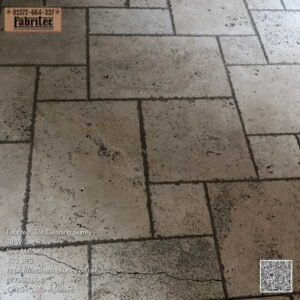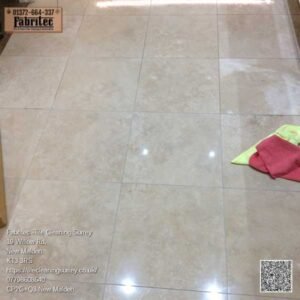


3 May 2025 by
sitemanager
Travertine floors add timeless charm and sophistication to any home, but cleaning them the wrong way can ruin them for good. If you’re living in Kingston-upon-Thames and thinking about using a steam cleaner on your stone floors, stop right there. What seems like a harmless clean could cause hidden damage that’s expensive to fix. In this article, we break down the real impact of steam cleaning travertine, local care insights, and smart, safe alternatives that will keep your floors looking flawless.
Travertine is a type of limestone formed by mineral deposits from hot springs. It’s porous, soft compared to granite, and features a natural, earthy look that adds elegance to homes. But those pores mean it can easily absorb water, cleaning agents, and grime.
Travertine comes in several finishes:
Knowing your travertine type matters before cleaning. Each finish reacts differently to moisture, heat, and pressure.
In short: No, steam cleaning is not recommended for travertine floors.
Steam cleaners shoot high-temperature vapor into surfaces. Travertine, being porous, can:
Travertine should always be sealed. However, steam can:
Steam might loosen dirt, but without proper extraction, it pushes it deeper, which can lead to:

Alkaline or acidic cleaners (like vinegar or bleach) degrade the stone. Instead:
Avoid saturated mops. A damp (not wet) microfibre mop does the trick without soaking the surface.
Always dry travertine after mopping to prevent moisture seepage. Use:
In the humid environment of the UK, especially older homes in Kingston with less airflow, sealing frequency matters more.
| Cleaning Method | Safe for Travertine? | Notes |
|---|---|---|
| Dry Dust Mopping | ✅ | Ideal for daily maintenance |
| Damp Mop with Ph Neutral Cleaner | ✅ | Weekly cleaning |
| Steam Mop | ❌ | Damages pores and sealant |
| Acidic Solutions (Vinegar) | ❌ | Corrodes surface |
| Stone-Specific Cleaners | ✅ | LTP Floorshine, LTP Waxwash, Fila Multi Surface Cleaner, HG natural stone cleaner streak free Always spot test first. |
| Professional Stone Cleaning | ✅ | For periodic deep clean and restoration |
Kingston-upon-Thames blends modern developments with historical architecture. Many homes feature traditional stone floors. Local homeowners and property managers are can call on professional Travertine cleaning by Fabritec Tile Cleaning in New Malden.

This customer in Kingston upon Thames hase a house with a beautiful Travertine floor, but the tiles were looking less than their original elegance after regular cleaning with a domestic steam cleaner. The tiles had lost their original sheen, soiled quickly after cleaning and soaked up stains like a sponge
The owner almost threw in the towel and considered ripping the whole thing out. But thankfully, they contacted their local professionals, Fabritec. And that’s where the magic began.
The first priority was restoring the stone’s appearance and integrity through a thorough deep cleaning process. Travertine requires more than a simple wipe-down; effective cleaning involves mechanical abrasion and precision.

Once the surface was restored, attention turned to the grout lines, which were heavily soiled and had not responded as well to the pad-based cleaning. Since rotary pads can’t effectively reach into recessed grout lines, I needed specialist equipment to address these areas.

I applied a strong stone-safe cleaner and degreaser, working it into the surface with a scrubbing machine. This helps break down built-up grime and emulsify greasy residues lodged in the pores and grout lines. I let it sit for about 10 minutes to soak in and loosen the embedded soil.
Then I brought out our high-pressure hot water rinse and capture system. It blasts hot water deep into the tiles, flushing out grime from the grout lines and the natural pits in the travertine that scrubbing just can’t touch.
Thanks to the heat and powerful vacuum extraction, the floor dries remarkably fast. This not only prevents moisture from reabsorbing into the stone but also means the surface is ready for sealing much sooner—often within the hour.

The owner wanted to keep a natural look, so I applied a high quality impregnating sealer, perfect for polished stone.
Use a diluted pH-neutral cleaner with a microfibre cloth. For deeper sanitation, contact a professional.
Not always. DIY kits exist, but a professional ensures full coverage and selects the best product for your floor.
It can seep in, causing dark patches, weakening the stone, and leading to mould.
Yes, light etching or haze may be corrected through honing and polishing. Consult a stone care specialist.